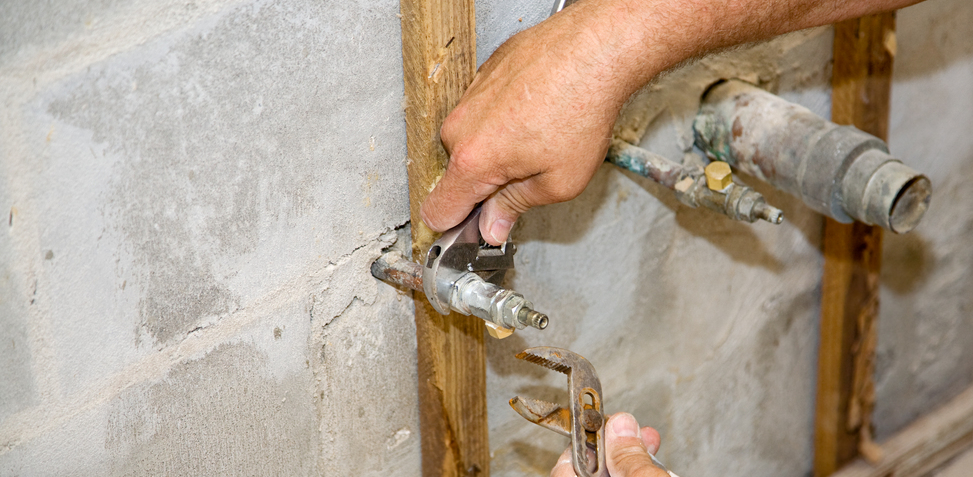Fixing Plumbing Issues in Older Homes: Effective Methods
Fixing Plumbing Issues in Older Homes: Effective Methods
Blog Article
Just how do you actually feel with regards to Plumbing Issues in Older Properties and How to Fix Them?

Older homes usually come with charm, character, and history, however they can additionally bring a host of plumbing problems. Whether you're managing maturing pipes, low tide pressure, or leaks, recognizing how to resolve these typical issues is critical to preserving a risk-free and useful home. In this guide, we'll check out the typical plumbing difficulties faced by older homes and give practical services to maintain your pipes in leading shape.
Understanding Typical Pipes Issues
Aging Pipelines
Among one of the most usual concerns in older homes is aging pipelines. Depending on the era in which your home was developed, the pipes could be made from products that have actually worn away in time, such as galvanized steel, cast iron, and even lead. These materials can corrode, end up being breakable, or create leakages, causing water damage and possible carcinogen.
Low Water Stress
If you're experiencing low water stress, maybe because of mineral deposits, deterioration inside the pipelines, or old components that are no longer functioning successfully. This can be a major hassle, specifically in locations like showers and sinks.
Leaking Pipes
Leakages are an additional regular problem in older homes, commonly brought on by corroded or damaged pipes. Also tiny leakages can lead to significant water damage, mold growth, and enhanced water bills if not attended to without delay.
Obsolete Components
Out-of-date plumbing fixtures such as faucets, commodes, and showerheads not just look old yet may additionally be less effective, vulnerable to leaks, or inappropriate with contemporary plumbing standards.
Pipeline Rust
Deterioration is an usual trouble in older pipes, specifically those made from galvanized steel or cast iron. Rusty pipelines can limit water flow, cause discoloration, and ultimately lead to leaks or pipeline bursts.
Examining the Condition of Your Pipes
Evaluating Visible Pipes
Beginning by inspecting any kind of noticeable pipelines in your home, such as those in basements, crawl spaces, or under sinks. Seek signs of corrosion, leaks, or rust, which can suggest underlying problems.
Checking for Leakages
Check for leakages by checking locations around taps, toilets, and under sinks. You can also monitor your water meter prior to and after a duration of no water use to find covert leakages.
Water High Quality Screening
Older pipes can affect the quality of your water. Conduct a water high quality examination to check for pollutants such as lead, rust, or other impurities that might be presented by maturing pipes.
Solutions for Common Plumbing Concerns
Changing Aging Pipes
If your home has old, deteriorating pipes, consider changing them with modern-day products like copper or PEX. This can be a substantial investment, yet it will certainly stop future problems and boost the safety and integrity of your pipes system.
Dealing With Low Water Pressure
To fix low water pressure, start by cleansing or changing old fixtures and removing mineral buildup in the pipelines. If the trouble persists, it might be required to replace sections of corroded pipes.
Fixing and Replacing Dripping Pipes
For little leakages, you can use pipeline clamps or epoxy putty as a short-term repair. Nonetheless, it's best to change dripping pipes totally to avoid further damage.
Upgrading Fixtures
Upgrading old fixtures to contemporary, water-efficient models can enhance your home's pipes performance and minimize water intake. Search for components with the WaterSense label for the best effectiveness.
Managing Pipeline Rust
If your pipelines are rusted, replacing them with corrosion-resistant materials like copper, PVC, or PEX is the best solution. Normal examinations and water top quality maintenance can help protect against better deterioration.
When to Call an Expert
While some pipes concerns can be managed with do it yourself services, there are times when it's best to contact a professional. If you're handling major leaks, considerable rust, or are unsure about the condition of your pipelines, a certified plumber can provide expert analysis and repair work.
Preventive Maintenance Tips
Regular Examinations
Frequently evaluate your pipes system for signs of damage. Capturing issues early can stop expensive repair work down the line.
Water Stress Regulation
Guarantee your water pressure is within the advised variety to avoid stressing your pipes and components. A plumbing technician can install a pressure regulator if required.
Water High Quality Maintenance
Install water filters or conditioners if your water top quality is poor. This can secure your pipelines and components from damages brought on by tough water or impurities.
Proactive Pipeline Replacement
If your home has very old pipelines, take into consideration positive substitute prior to major concerns develop. This can save you from emergency repair services and water damage.
Verdict
Handling pipes issues in older homes requires a mix of watchfulness, precautionary maintenance, and timely upgrades. By recognizing the common challenges and understanding when to look for professional help, you can ensure your pipes system stays functional and reputable for many years to find.
Common Plumbing Issues in Older Homes
Pipe corrosion
Pipe corrosion is a common plumbing issue in older homes. Several factors can cause pipes to corrode:
Water: Ironically, water is the number one cause of pipe corrosion. When water seeps into cracks in pipes, it can cause the metal to rust and break down, leading to leaks or even burst pipes.
Oxygen: Oxygen is another significant culprit in pipe corrosion. When oxygen interacts with water, it can cause the metal to oxidize and weaken.
Chemicals: Chemicals such as chlorine and fluoride can also contribute to pipe corrosion. These chemicals can react with the metal in pipes, causing them to break down over time.
Leaky pipes
Pipes that leak is one of the most common plumbing issues plaguing residents of older houses. While a small leak may not be a problem initially, it can lead to significant problems if left unaddressed. In addition, water damage can be very costly to repair and may cause damage to electric fixtures, promote mold growth and cause many other issues.
Worn-out fixtures
Older homes often have worn-out fixtures which may need replacement. Over time, the finishes on fixtures can wear down, exposing the underlying metal to corrosion. This can cause fixtures to leak or even break completely. It s best to have a professional plumbing contractor regularly inspect the fixtures in older homes and replaces them if necessary.
Faulty water heaters
A leaky water heater can cause severe damage to the home as it can be both a flood and fire hazard. Call a plumber immediately if it appears that the water heater might be leaking.
If the heater isn t working correctly, it could be because the pilot has gone out. The pilot light going out may indicate gas supply issues or leaks. It is also worth checking the thermostat to see if it needs to be adjusted.
If the water heater is making strange noises, it could be due to sediment buildup in the tank. Sediment can interfere with the heating elements and cause them to overheat. Overheating can damage the tank and shorten the lifespan of the water heater.
https://www.norfleetfamilyplumbing.com/blog/common-plumbing-issues-in-older-homes

I'm very fascinated by Plumbing Issues in Older Properties and How to Fix Them and I hope you liked my piece. For those who enjoyed our post please do not forget to pass it around. I take joy in reading our article about .
Call Today Report this page